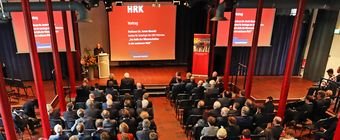The HRK

About the HRK
The German Rectors' Conference (HRK) is the association of state and state-recognised universities in Germany. The member institutions are represented in the HRK by their executive boards and rectorates. The HRK currently has 272 member institutions, at which around 90 per cent of all students in Germany are enrolled.
Due to this large membership, representing all types of higher education institution, the HRK functions as the voice of the universities in dialogue with politicians and the public and as the central forum for opinion-forming in the higher education sector.
The HRK deals with all issues relating to the role and tasks of higher education institutions in academia and society, especially teaching and learning, research, innovation and transfer, scientific further training, internationalisation, and university self-administration and governance.
The HRK has three main tasks:
1. Opinion-shaping and political representation. Through the HRK, the individuals responsible for university management can stay abreast of new developments in the higher education system, discuss issues in research and higher education policy and develop joint positions. On this basis, the President and Executive Board of the HRK represent the interests of the member institutions in dialogue with politics and administration at Federal and State Government level and in the public sphere. As well as responding to issues and positions that are already the subject of political and public debate, the HRK actively sets the agenda for discussion.
2. Development of principles and standards in the higher education system. In central areas of the German research and education system, the HRK engages in intensive dialogue with partners in academia, the federal and state governments, employers’ associations, trade unions and many others to formulate jointly accepted and long-term norms and standards.
3. Services to higher education institutions and the public. The HRK assists its member institutions and the public with a range of services. For example, it provides support to member institutions in relation to internationalisation (The HRK), the digitalisation of teaching (Higher Education Forum on Digitalisation) and the development of study programmes (the nexus project), provides politicians, the media and industry with in-depth and up-to-date information on the higher education system, especially the courses on offer (Higher Education Compass), and helps students to find the right course (clearing system for study places).
The work of the HRK is based on decisions made by its bodies (the General Assembly, the Senate and the Executive Board). Decisions are developed in the Standing Committees, working groups and project groups and prepared and implemented by the offices in Berlin, Bonn and Brussels. The HRK represents the higher education sector in the Alliance of Science Organisations in Germany, and is a member of the European University Association (EUA). The financial and legal body of the HRK is the Stiftung zur Förderung der Hochschulrektorenkonferenz (Foundation for the Promotion of the HRK).
The HRK was established in 1949 as the West German Rectors’ Conference (WRK). Following the unification of the two German states, the first higher education institutions from the new federal states joined on 5 November 1990 and the WRK was renamed the German Rectors' Conference (HRK) (read more about our History (in German)).
